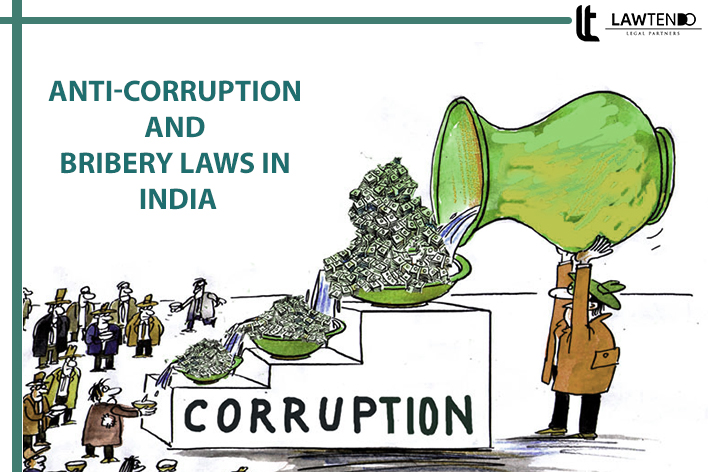Anti-corruption laws in India. How might they help?

Date : 09 Dec, 2019
Post By Bhupender Tanwar
Being the world's second-most crowded nation, India is portrayed by a huge and highly differentiated political structure. To oversee such an immense populace, the government of India has additionally been isolated and separated into a hierarchy order to deal with the nation better. It is regular and very obvious that, with such an enormous number of government representatives working in various sectors of government at different levels, corruption makes its grounds and is unavoidable. Be that as it may, the government has made suitable strides by providing and executing strict anti-corruption laws so as to deal with the corruption happening at different degrees of the work hierarchy order in both government and private divisions. Each business is dependent upon numerous guidelines, regulations from both the centre and the state, company compliances, organizational reporting laws and enrollment laws so as to hold corruption at all levels under check. Even after such exacting laws, corruption isn't extraordinary in India and India positions 78 out of 180 nations in the Corruption Perceptions Index, 2018. However, the public’s open disappointment towards moves made against corruption has prompted the arrangement of stricter laws against corruption in India as of late. Several administrative measures have been acquainted by the Government to handle corruption. Remuneration, tax evasion, Benami exchanges, salary and resource tax collection, Income tax and asset taxation, money-laundering have been managed in new laws and government has overhauled their game against corruption laws in India which is similarly upheld by the Indian Judiciary. What are the Anti-corruption Laws in India? Different anti-corruption laws in India restrict debasement and deal with such offences genuinely. Mentioned below are some anti-corruption laws which are commonly used in India: 1. The Prevention of Corruption (Amendment) Act, 2018 The Prevention of Corruption (Amendment) Bill is a change in the Prevention of Corruption Act, 1988. This incorporates arrangements of Corruption Act, 1947, Certain Sections of Indian Penal Code, The Criminal Procedure Code and The Criminal Law Act, 1952. This Act condemns receipt of any 'undue advantage' by the public workers and giving of this undue favourable position to someone else. The offence under PCA incorporates: (I) Public worker exploiting deliberately or as a prize for playing out his duties unethically or dishonestly (ii) Public worker exploiting without thought of the individual concerned in a business exchange or proceeding by a similar local official or to whom the worker is a subordinate. (iii) Any wrongdoing of a criminal sort directed by a public worker or if the public servant is a habitual offender. The PCA likewise focuses on the offence by middlemen, impact sellers, Influence peddlers or intermediaries who advance bribery and exploit people to get some gains. 2. Right To Information Act, 2005: The RTI Act enables the citizens of India to get data that is being held by any public authority, subject to exemptions in issues of national interest, administrative benefits and right to privacy. RTI promotes maximum transparency in government issues. RTI Act additionally expects, public authorities to publically uncover data with respect to their facts, policies, choices that influence people in general. A different authority has been set up, both at central and state level to screen RTI complaints under the RTI Act and take speedy actions and give information in as less as 48 hours. 3. Benami Transactions and Prohibitions Act, 1988 Under this Act, the Government is just entitled to procure the Benami property for which some consideration needs to be paid. Under this law, if once the property has been announced as 'Benami', the power on it will lie with the government and they will not have to pay any consideration for the same. To restrict corruption, an individual who is seen as liable of a Benami exchange will be at risk to pay a fine which may reach out up to 25% of the market estimation of the property and may likewise be detained for as long as 7 years. 4. Income Tax Act, 1961 Prosecution under Section 276C of Income-tax Act, 1961 provides the prosecution for wilful attempt to manipulate the chargeability or imposition of taxes, penalty or interest. Section 161 - 165 of IPC deal with various offences of corruption. 6. Prevention of Money Laundering Act, 2002 Enacted by the NDA government Prevention of Money Laundering Act helps to prevent money-laundering and provide for seizure of properties that have been acquired from money-laundering. The Act states that any person, who is found guilty of money-laundering shall be punished with imprisonment of a rigorous nature from 3 to 7 years and may extend up to 10 years. Lawtendo empanels over 15000 lawyers and experienced advocates with them. Get connected to experienced lawyers at just INR 600 in no time and discuss your case in detail.





